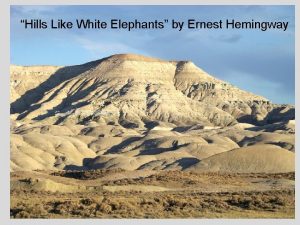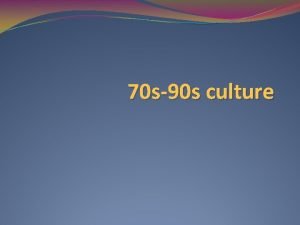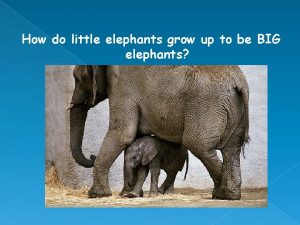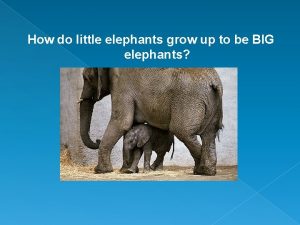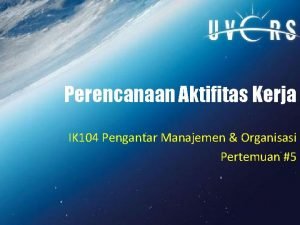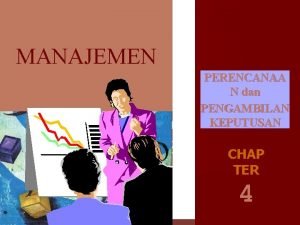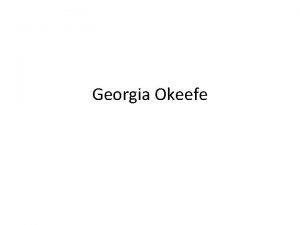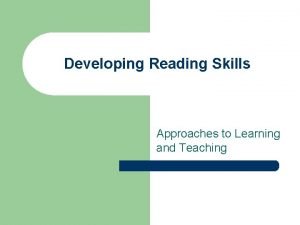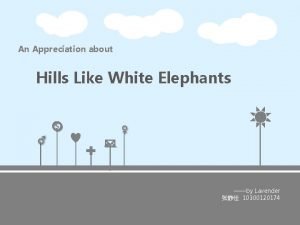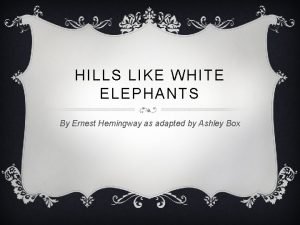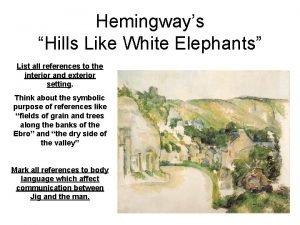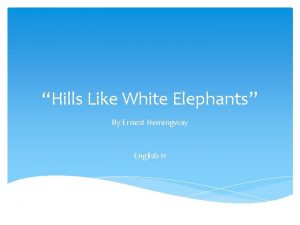HILLS LIKE WHITE ELEPHANTS SPRING 2019 READING GOALS









- Slides: 9

“HILLS LIKE WHITE ELEPHANTS” SPRING 2019

READING GOALS For this text, we will focus on making inferences about character relationships, plot, and the topic of alienation. Alienation - the loss of or lack of sympathy; the state or experience of being isolated from a group or an activity to which one should belong or in which one should be involved

HEMINGWAY BACKGROUND INFO Why did the chicken cross the road? Ernest Hemingway: “To die. Alone. In the rain. ” Ernest Hemingway is well-known for using very short sentences, and sometimes sentence fragments, in his writing. He wanted to force people to mentally ‘fill in the blanks’ of his writing, and he was also known for his themes relating to loneliness and isolation.

THE ICEBERG PRINCIPLE • What is the one most important fact that most people know about icebergs, which is particularly relevant if you are sailing near them or in areas where there are icebergs? Answer – the majority of the iceberg is located under the water.


In Death in the Afternoon, Hemingway outlined his ‘theory of omission’ or ‘iceberg principle. ’ He states: “If a writer of prose knows enough about what he is writing about he may omit things that he knows and the reader, if the writer is writing truly enough, will have a feeling of those things as strongly as though the writer had stated them. The dignity of movement of the iceberg is due to only one-eighth of it being above water. The writer who omits things because he does not know them only makes hollow places in his writing. ”

ICEBERG PRINCIPLE CONTINUED “Show the readers everything, tell them nothing. ” Ernest Hemingway 6 Word Short Story For Sale: Baby Shoes—Never Used. • What does Hemingway expect you, as a reader, to infer by reading between the lines? ”

WHITE ELEPHANT Once there was a cruel and unjust king in an ancient kingdom in Asia. One of his subjects displeased him, so he sent to that subject a white elephant, as a ‘gift. ’ In that culture, a white elephant was sacred, and could not be slaughtered for meat or other uses, and could not be put to work (as other elephants might be) as a labor-animal. The unlucky subject thus had to care for and feed the elephant, which lives on average as long as a human, and over the course of his life the expense of caring for and feeding the elephant (which has an enormous appetite) ruined him financially, leaving him destitute.

VOCABULARY White Elephant - A possession that is useless or troublesome; an unwanted gift. Reale – Spanish coin/currency Cervesas, absinthe, anis – alcoholic drinks
 Theme in hills like white elephants
Theme in hills like white elephants Hills like white elephants theme
Hills like white elephants theme Hills like white elephants page count
Hills like white elephants page count How do little elephants grow up to be big elephants
How do little elephants grow up to be big elephants How do little elephants grow up to be big elephants
How do little elephants grow up to be big elephants Hills like white elaphants
Hills like white elaphants Strategic goals tactical goals operational goals
Strategic goals tactical goals operational goals Strategic goals tactical goals operational goals
Strategic goals tactical goals operational goals Ram's head white hollyhock and little hills
Ram's head white hollyhock and little hills While reading activities
While reading activities

